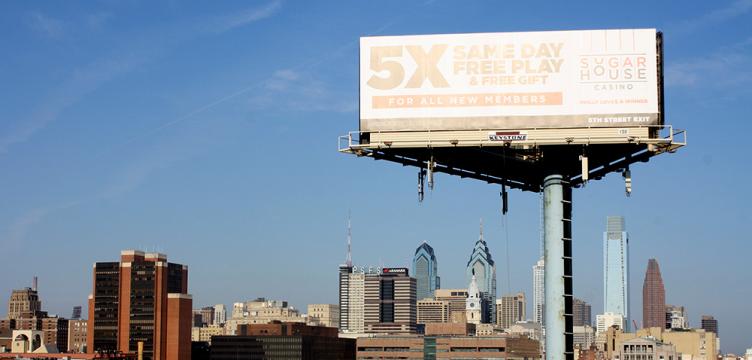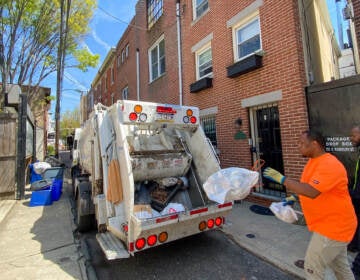Philadelphia loses jurisdiction over highway billboards

Billboards along Philadelphia’s highways are now under state control.
Earlier this month, the Federal Highway Administration approved PennDOT’s transition plan to take over billboard regulation along Philadelphia’s state and federal roads. PennDOT revoked the city’s Outdoor Advertising Certification in April, after City Council adopted a bill overhauling the city’s zoning rules for billboards.
From now on, PennDOT will issue permits for all new and existing billboards along state and federal highways in Philadelphia. It’s also establishing its own inventory of billboards, and it will require billboard companies to remove any signs that are illegally placed or don’t have proper licenses or permits.
“We had been working with the Federal Highway Administration and the city on this issue for several years and we decided that the outdoor advertising control would be most effectively managed through PennDOT’s permitting resources,” said PennDOT spokesman Rich Kirkpatrick, in an email. “PennDOT has an obligation to provide effective control of outdoor advertising devices or risk losing 10 percent of federal highway funding.”
Under the terms of the federal Highway Beautification Act, states that are found to be in violation of rules prohibiting billboards along certain roadways can be subject to a 10-percent reduction in their highway funding. Scenic Philadelphia, a group that advocates for decluttering public space, has warned that Philadelphia might be in violation of the Highway Beautification Act a number of times. Scenic raised the concern when City Council approved a large wraparound billboard at the Electric Factory near 7th and Callowhill streets, a bill which was later vetoed by Mayor Michael Nutter. The group raised the concern again when Council approved a bill allowing Catalyst Outdoor to build three-dimensional digital billboards at a few key Center City corners.
Despite PennDOT’s diplomatic language, it’s a pretty drastic move. Philadelphia has been certified to regulate billboards since 1974, but the most recent failure to adopt new billboard regulations fits into a larger pattern. The city’s previous attempts to update its billboard regulations, in 1991 and 2005, were stymied by lawsuits from the billboard industry. The Zoning Code Commission, appointed to overhaul all of the city’s zoning regulations starting in 2007, decided not to touch the chapter on signs, knowing that doing so had its own political risks that could jeopardize the whole endeavor. Eventually, Councilman Bobby Henon took up the task of trying to negotiate new rules between industry lobbyists and anti-billboard activists. The bill Henon ultimately introduced was adopted by City Council just before PennDOT decided to intervene. Council then recalled that bill as it waited to see what would happen next.
In a letter dated December 3, the Federal Highway Administration described a “transition plan” that would have PennDOT take over the primary responsibility for establishing and enforcing billboard regulations on Philadelphia’s highways. PennDOT will create an inventory of existing signs along state and federal highways by July 1, 2016. It will notify the billboard companies of any illegal signs and order them removed, subject to an appeals process, according to Rich Kirkpatrick.
Scenic Philadelphia applauded the move in a blog post last week.
“… the bottom line is that billboards in Philadelphia will be subject to much more serious scrutiny, and violations dealt with much more quickly than they were under city control,” the group wrote. “This change is a huge step forward for those of us who care about how billboard blight negatively impacts our city, and Scenic Philadelphia has been pushing for this change for nearly 20 years.”
As of last Thursday, Councilman Bobby Henon hadn’t heard that FHWA had approved PennDOT’s plan. Henon’s office wasn’t available to comment on Monday. Andrew Ross, a deputy city solicitor who works on zoning issues, was also unavailable.
WHYY is your source for fact-based, in-depth journalism and information. As a nonprofit organization, we rely on financial support from readers like you. Please give today.





